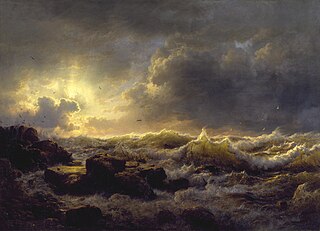Related Research Articles

The Homeric Hymns are a collection of thirty-three ancient Greek hymns and one epigram. The hymns praise deities of the Greek pantheon and retell mythological stories, often involving a deity's birth, their acceptance among the gods on Mount Olympus, or the establishment of their cult. In antiquity, the hymns were generally, though not universally, attributed to the poet Homer: modern scholarship has established that most date to the seventh and sixth centuries BCE, though some are more recent and the latest, the Hymn to Ares, may have been composed as late as the fifth century CE.
This article contains information about the literary events and publications of 1828.
This article contains information about the literary events and publications of 1816.
The following literary events and publications occurred in the year 1763.
This article contains information about the literary events and publications of 1772.
This article contains information about the literary events and publications of 1770.

This article contains information about the literary events and publications of 1776.
This article contains information about the literary events and publications of 1778.
This article contains information about the literary events and publications of 1752.
This article contains information about the literary events and publications of 1760.
This article presents lists of the literary events and publications in 1765.
This article contains information about the literary events and publications of 1779.

Sturm und Drang was a proto-Romantic movement in German literature and music that occurred between the late 1760s and early 1780s. Within the movement, individual subjectivity and, in particular, extremes of emotion were given free expression in reaction to the perceived constraints of rationalism imposed by the Enlightenment and associated aesthetic movements. The period is named after Friedrich Maximilian Klinger's play of the same name, which was first performed by Abel Seyler's famed theatrical company in 1777.
Nationality words link to articles with information on the nation's poetry or literature.
Nationality words link to articles with information on the nation's poetry or literature.
Nationality words link to articles with information on the nation's poetry or literature.
Nationality words link to articles with information on the nation's poetry or literature.
Nationality words link to articles with information on the nation's poetry or literature.
Nationality words link to articles with information on the nation's poetry or literature.

The Seyler Theatre Company, also known as the Seyler Company, was a travelling theatrical company founded in 1769 by Abel Seyler. It was one of the most famous and ambitious theatrical companies of Europe in the years from 1769 to 1779, and played a crucial role in theatrical innovation, the development of a serious German opera tradition, and the Sturm und Drang movement. The Sturm und Drang period is named for a play commissioned by the Seyler company.
References
- ↑ Cox, Michael, ed. (2004). The Concise Oxford Chronology of English Literature . Oxford University Press. ISBN 0-19-860634-6.
- ↑ Only a Novel: The Life of Fanny Burney, 15 July 2011. Accessed 7 February 2013.
- ↑ Williams, Hywel (2005). Cassell's Chronology of World History. London: Weidenfeld & Nicolson. p. 331. ISBN 0-304-35730-8.
- ↑ Manushag N. Powell (2012). Performing Authorship in Eighteenth-century English Periodicals. Lexington Books. p. 200. ISBN 978-1-61148-416-8.
- ↑ West, Martin (2011). "The First Homeric Hymn to Dionysus". In Faulkner, Andrew (ed.). The Homeric Hymns: Interpretative Essays. Oxford University Press. pp. 29–43. doi:10.1093/acprof:oso/9780199589036.003.0002. ISBN 9780199589036.
- ↑ Leavis, Q. D. (1965). Fiction and the Reading Public (rev. ed.). London: Chatto & Windus.
- ↑ Liebersohn, Harry (January 2005). "A Radical Intellectual with Captain Cook: George Forster's world voyage". Common-Place. 05 (2). Archived from the original on 6 July 2019. Retrieved 6 July 2019.
- ↑
 This article incorporates text from a publication now in the public domain : Stephen, Leslie, ed. (1889). "Fortescue, James". Dictionary of National Biography . Vol. 20. London: Smith, Elder & Co.
This article incorporates text from a publication now in the public domain : Stephen, Leslie, ed. (1889). "Fortescue, James". Dictionary of National Biography . Vol. 20. London: Smith, Elder & Co. - ↑ Samuel Foote (1797). The Dramatic Works of Samuel Foote: To which is Prefixed a Life of the Author. A. Millar. p. 6.